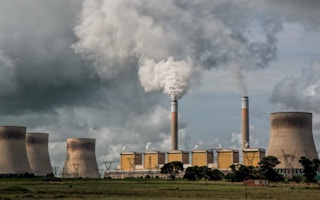Technology promoted by Japanese policymakers as a clean way to burn coal enables the country to avoid a rapid transition away from the fossil fuel and undermines its national climate action policies, according to a new report by an environmental group.
To continue reading, subscribe to Eco‑Business.
There's something for everyone. We offer a range of subscription plans.
- Access our stories and receive our Insights Weekly newsletter with the free EB Member plan.
- Unlock unlimited access to our content and archive with EB Circle.
- Publish your content with EB Premium.
Japan has been aggressively pushing technologies such as coal gasification and carbon capture, use and storage (CCUS) in a bid to hit its 2050 carbon-neutral target. During COP26 climate talks in November, Prime Minister Fumio Kishida outlined Japan’s plans to reconcile the country’s use of coal with its net-zero pledge. These technologies have been labelled “clean” because they lower the emissions of burning coal, which is the single biggest contributor to man-made climate change.
The report, titled Coal-de-sac: Advanced Coal in Japan by London-based climate analytics group TransitionZero, found that the carbon intensity of Japan’s clean coal technologies is five times higher than what is required for the country to be on track to achieve its 2050 net-zero target.
CCUS, which captures and stores carbon dioxide before it is released into the atmosphere, has the most emissions-reducing potential, but Japan has limited suitable CCUS sites, such as retired gas fields, said Jacqueline Tao, an analyst at TransitionZero. Japan’s CCUS storage potential will run out in a decade, she said, adding that carbon capture technology faces “operational and financing issues.”
Japan highlights the struggle to fulfill ambitious climate change goals while maintaining a secure, stable energy supply to sustain economic growth. Japan, which relies on imports for nearly 90 per cent of its energy needs, generates a third of its electricity from coal.
The nation has been slow to make concrete commitments to phase out coal in the near term. In its recent national energy plan, coal is projected to supply about one-fifth of power demand by 2030. The county is also one of the biggest exporters of coal-burning technology and has been criticised for funding overseas plants that using the highly polluting fossil fuel. Japan pledged last May to stop funding coal projects beyond its borders, continues to fund overseas coal projects that deploy carbon-trapping technologies.
In January, climate activists targeted Japanese financiers for funding a coal-fired power plant in Bangladesh that they said would imperil the climate-vulnerable country. A Bangladeshi official defended the plant, saying it would use new technologies to limit emissions and avoid environmental harm.
Clean coal technologies are more expensive than renewables. The average levelised cost of clean coal technologies such as gasification and ammonia co-firing are at US$200 megawatts per hour — more than double the average cost of solar energy projects, the study found. Coal gasification converts coal into a lower-emitting synthetic gas, while ammonia co-firing is used as a way to lower the emissions of burning coal.
Even factoring in the cost of battery storage, solar and onshore wind are cost-competitive with most advanced coal technologies, the report noted. “At best, these technologies will achieve marginal emission reductions and at worst, they will extend the lifetimes of high cost, carbon intensive and energy insecure coal plants,” Tao told Eco-Business.
The report’s authors recommend that Japanese policymakers pivot from coal to mature renewables, which they say are both more cost efficient and less emissions-intensive than all advanced coal technologies, and invest in offshore wind, “which could unlock significant economic potential for Japan long-term.”
Japan is expected to continue its dependence on fossil fuels as it has limited available space to significantly expand solar power, while the country’s wind capacity is building slowly.

















